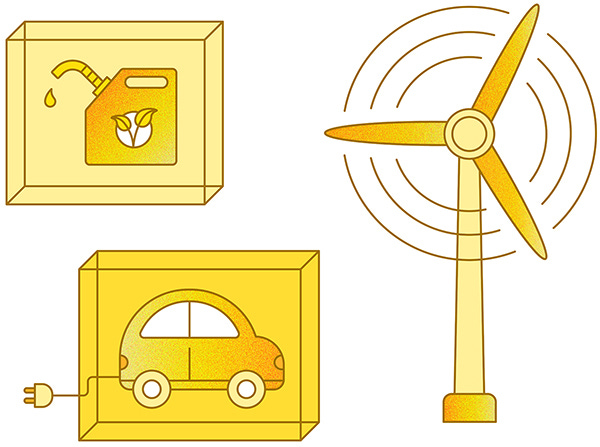Planet of the Humans, Coronavirus hits renewables & Oil goes negative (not carbon)
The newsletter for independent thinkers on carbon and climate.

(source: Planet of Humans)
MEDIA
See Michael Moore’s "Planet of the Humans" before it’s banned
Planet of the Humans, the new documentary film from director Jeff Gibbs and executive producer Michael Moore, contains a stunning criticism of green energy and the people profiting from it. It was released on April 21 for free viewing on YouTube and as of the afternoon of Friday, April 24, had been viewed over 1.5 million times.
However, it may not be available for public viewing much longer. A pressure campaign is underway to get the distributor to pull the film. Josh Fox, who directed 2010's documentary, Gasland, launched the campaign on Twitter and tweeted Friday afternoon that the distributors had agreed to withdraw Planet of the Humans.
Every type of green energy is exposed as phony, useless, or inextricably dependent on fossil fuel production and large-scale hardrock mining. The targets include wind power, solar power, ethanol, biomass, battery storage, electric vehicles, and seaweed.
The film features Al Gore, Bill McKibben, Richard Branson, Robert F Kennedy Jr., Michael Bloomberg, Van Jones, Vinod Khosla, Koch Brothers, Vandana Shiva, General Motors, 350.org, Arnold Schwarzenegger, Sierra Club, the Union of Concerned Scientists, Nature Conservancy, Elon Musk and Tesla.
Creed Comments: I promised to deliver the good, bad and ugly on carbon and climate. Watch for yourself and you decide where this controversial film falls in that spectrum.
Issue No. 24
Welcome to the latest issue of Carbon Creed - a curated newsletter for people “woke” on carbon and climate.
My name is Walter McLeod, and I’m glad you’ve joined our tribe! We hope to hear from you as we navigate this weekly journey through the good, bad and ugly of carbon and climate.
This week we launched several new features:
FIRST OPEN THREAD - EARTH DAY (April 22, 2020)
FIRST GUEST POST - LUKE MAKAI (Endless Metrics)
We intend to make open threads a regular feature of Carbon Creed. We really want to hear your voices and learn more about what you’re interested in - the open thread gives us an opportunity to do that. Thanks to everyone who contributed to the inaugural thread (you can still add your 2 cents)!
This issue we are proud to feature an article by Luke Makai - fellow Substack colleague and publisher of Endless Metrics, a daily newsletter covering cool trends that shape the economy. Be sure to check out his article below, “Oil has a bad day.”
As always, feel free to ping me anytime at mcleodwl@carboncreed.com.
If you are a subscriber, THANK YOU, and please share this to a friend.
If you haven’t subscribed, GIVE US A TRY, you can opt-out at anytime.
Now, LET’S GO DEEP!
FINANCIAL MARKETS
Oil has a bad day
By Luke Makai (Endless Metrics)
Ever seen a crash so bad it goes below zero?
Ups and downs happen. There are good days and bad days. And then, there’s oil. A commodity so popular that it has basically driven a large portion of geopolitics for several decades, just had a confidence-crushing equivalent of throwing a party and nobody showing up:

Yes, that’s the price of oil falling below zero. Not just by a tiny bit but almost by negative forty dollars.
First, how does that happen? With stocks, they can go to zero but they can’t go negative. It’s not like you buy a stock in a company that goes bust and then have to pay someone to get rid of the stock - it just becomes worthless and, sort of, disappears.
But oil is a physical commodity. So, when people buy contracts, it eventually has to get delivered. In a functioning society, people sell this oil, get money, and deliver it to people who want it.
In a society where norms are fundamentally broken by a global pandemic, it’s not so simple. People aren’t leaving their homes - meaning very little driving, flying, or other fun methods of transportation. All those modes of transit need gas, which comes from oil. Therefore, demand is extremely limited.
While that greatly simplifies all the things oil is used for, the general point is that nobody really wants the stuff at the moment. That means for oil contracts expiring very soon where delivery of the physical asset is required, the usual system of paying to receive it doesn’t work.
Right now, all these producers have oil and no one is willing to take it. In fact, the people who may want it might not even be able to put it anywhere because their storage capacity is full.
For people who want to deliver oil when no one wants it, the market has come to a solution. They have to pay people to take it. And, that’s how you get negative prices.
Imagine that. It’s almost unthinkable what just happened. Oil, a commodity so precious its nickname is “black gold”, has no home. Because it has to be put somewhere eventually, it now has negative value. Buyers are literally saying, “Fine, I’ll take the oil but only if you pay me to do so.”
Now, oil isn’t really worthless - it’s just the current round of contracts expiring that are. People will use it eventually, so contracts for later dates are sitting at more normal prices.
But, the fact that this is happening, if even just for the very short term, implies something broken in the system. While there are a lot of explanations for this phenomenon (mine included), I don’t think anyone really understands the full picture of what is happening here.
I say that because until this happened, it was an unthinkable scenario. So, in my opinion, if something occurs that just a few days ago would've been laughed at as implausible, I don't believe there is a tidy explanation that captures the intricate nuance of the situation.
Until this confusing tangled web of oil prices gets undone, understood, and resolved, the simple stories and explanations are all we have. Maybe it’s the best we can do. Because, come on, seriously? Negative prices? What just happened is truly insane.
Creed Comment: Investors should expect the climate crisis to cause more downward pressure on the price of carbon rich products. Keep an eye on this trend. LINK
INSIGHTS
A symposium of thoughts on climate change

(source: Ashleigh Olinger/NYT)
The science is clear: The world is warming dangerously, humans are the cause of it, and a failure to act today will deeply affect the future of the Earth.
This week the New York Times published a 7-part crash course on climate change, in which seven reporters from the Times’s Climate desk address the big questions:
How bad is climate change now?
How do scientists know what they know?
Who is influencing key decisions?
How do we stop fossil fuel emissions?
Do environmental rules matter?
Can insurance protect us?
Is what I do important?
Creed Comment: This symposium on climate is a nice homage to the 50th anniversary of Earth Day. Highly recommend you take the plunge and dive deeper. LINK
CORPORATE CITIZEN
Will the virus “break” the renewable energy market?

(source: RE100)
Markets of all sorts, in every part of the world, are responding to the shock of Covid-19. Almost nothing is left untouched, whether it’s consumer-facing, a luxury, or a commodity. Looking across a number of markets this week, there are two states: bending and breaking.
One bending market has been U.S. aviation. On March 6, checkpoints run by the Transportation Security Administration processed nearly 2.2 million passengers. On March 31, the TSA processed all of 146,000—a nearly 93% decline.
A broken market occurs where nothing is transacting at all. Last week, an auction for European Union aviation carbon allowances failed, with just four airlines bidding. Demand for air travel is so low, and therefore airlines’ energy consumption and emissions as well, that their need for permits has fallen to the point where there’s no market to be made.
Looking ahead, it’s worth watching corporate sustainability markets to see how much they bend (or if they break) in our current economic climate.
Consider the RE100, a group of corporations that have committed to meet 100% of energy demand with clean sources. There were 12 members when it was founded in 2014; now there are 221. How many more companies will make such a commitment given everything else corporate executives now have to focus on? Companies might not renege on commitments, and if they do, they probably won't make much noise about it.
But there’s a more immediate—and more market sensitive— place to watch this dynamic play out: corporate renewable energy power purchase agreements.
The appetite to sign more of these agreements will certainly be curbed. Falling power demand should depress power prices in most markets, making grid power more attractive. (Although in many places, renewables will still at least be competitive, if not the lowest-cost option.) From a CFO’s perspective right now, “sustainability” is probably more about keeping a business going than examining its electricity mix.
Creed Comment: a signifiant slowdown in corporate clean power purchase agreements, could halt the U.S. renewable energy markets. However, we don’t see that happening. Our worse case prediction is a painful bend, but no break in growth. Go deeper here LINK.
RESOURCES
The Keeling Curve a daily record of global atmospheric CO2 concentration.
Congressional Policy Tracker a summary of current federal energy legislation.
Click Clean your favorite apps and tech company clean power rankings.
Advancing Inclusion Through Clean Energy Jobs a report by the Brookings Institute.
Guide to Understanding the 5 Different Types of Electric Vehicles – read this before you buy or lease your next electric car.
Thanks for sharing your time with us!
If you enjoyed this newsletter but aren’t yet subscribed, sign up for a free subscription below.
If you are a subscriber, THANK YOU AGAIN, and please forward this to a friend.
👋 Questions, comments, advice? Send me an email!
Curated by Walter McLeod, Founder and Editor-in-Chief of Carbon Creed and Managing Partner with Eco Capitol Energy.



